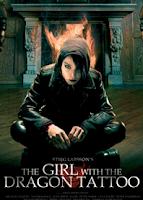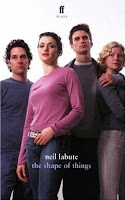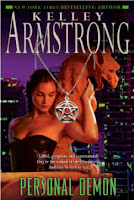
** This review will contain minor spoilers for The Girl with the Dragon Tattoo. **
The Book: The Girl Who Played with Fire (book two of the Millennium Trilogy)
The Author: Stieg Larsson
How I Found It: I absolutely loved the first book (see below).
The Review: As promised, I finished by the end of April and what a ride it has been. There is no question in my mind now that buying and reading The Girl Who Kicked the Hornet's Nest is going to be one of the first things I do this summer. (It conveniently comes out right as the semester ends. :D)
The book picks up about a year after the events of Dragon Tattoo. Lisbeth has been traveling abroad for a year and has cut off all contact with Blomkvist, convinced he loves Erika and she should never have fallen in love with him. She is in Grenada and has set up a new life for herself. She has gotten implants, a lover, and a new problem to work on--solving Fermat's Theorem.
However, as Salander lives out her idyllic life in Grenada, someone is plotting revenge. Bjurman, her guardian, has not forgotten that Lisbeth took her revenge on him and has blackmail hanging over his head. Convinced she needs to be dealt with, he begins an investigation into Lisbeth's past--and finds out that it is more of a secret than he ever imagined. There are other people who want Lisbeth silenced or dead, and Bjurman's more than prepared to work with them.
Meanwhile, Mikael Blomkvist is rather puzzled. He has not heard from Lisbeth in a long time and the last time he saw her, she deliberately ignored him. He is soon occupied with another issue, as Millennium is presented with an opportunity to run an explosive story. Journalist Dag Svensson and his girlfriend Mia Johansson have extensive research on a sex trafficking operation that reaches far into Sweden's highest-ranked officials. Journalists, police officers, politicians will be exposed if the story is published. Unable to resist the story, Millennium agrees to publish it.
Salander returns to the country as Svensson, Blomkvist, and others begin to dig deep into the story. But all too quickly, Dag and Mia are murdered, and Lisbeth's fingerprints are all over the murder weapon. Blomkvist knows all too well that Lisbeth has a violent side, but he is convinced that she cannot be the killer. As the police, Millennium, and Lisbeth's former coworkers search for the truth, Lisbeth's dark past begins to come to light.
I will admit that I found this book a little bit more confusing than Dragon Tattoo--when you've got three different teams running three different investigations, it gets very difficult to keep track of who is who. Another set of names to keep track of is the list of johns Svensson had, and later a whole host of other names possibly related to the murders. There's also a choice Larsson makes structurally--we do not see Lisbeth for most, if not all, of Part 3. After the murders occur, Lisbeth is offstage while the teams investigate. Then, in Part 4, we rewind to see what Lisbeth has been doing during the same period of time. I understand why Larsson did it, but it was somewhat confusing to sit there and try and remember where the investigation had been at that point.
This is a solid second entry in the trilogy. We see more of Blomkvist as a journalist and investigator--there is hardly any of his family life or womanizing here as compared to the first book, though there is some. It's interesting to see a different side of him. Erika gets a little more screentime and a plot that will be developed in third book. The explanation of her background here helped me understand her more, since now we are given her reasons for the open marriage and a few other things. I liked her more once this explanation was given about how she came to be who she is.
And of course, we get much more insight into Lisbeth Salander, who is becoming one of my most beloved fictional characters. This book directly concerns the mystery of her past and although she is offstage for much of it, her scenes in the book are definitely the most engaging. She and Blomkvist are estranged, but there is some electronic communication that I hope is somehow preserved onscreen. Even with its urgency, there was a sweetness to it and it was a nice reminder of the relationship they had with each other in the first book. Blomkvist and Salander do not team up in the sense they did in Dragon Tattoo, but it doesn't hurt the book all that much. Even if the three investigations were difficult to keep track of, they were all interesting.
I think the book did exactly what a second book in a trilogy should do--developed all the important characters from the first book, picked up the unresolved plotlines, gave us a compelling new mystery, and led us with the force of a sledgehammer into the third one. I'm glad I only have to wait a few more weeks for the third book; I can understand now why people have been importing copies from the UK! The ending is heart-poundingly suspenseful and I had tears in my eyes as I finished. I know I will race through Hornet's Nest with bittersweet feelings--I don't want it to be the end. I hope that someday Larsson's family will allow the fourth book to be completed; the world needs more books like this one. Important issues are exposed in a fascinating way, with characters just as memorable as the story.




